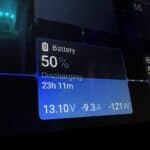
MENUMENU
TALK TO AN EXPERT
Special Hours: 7AM – 6PM PST
TALK TO AN EXPERT
Special Hours: 7AM – 6PM PST
Whether you’re camping off-grid in your RV or enjoying a beautiful day on the water, having a battery bank you can rely on is essential. This becomes especially critical if Mother Nature doesn’t cooperate, and you find yourself unexpectedly in freezing temperatures. It’s no secret that cold weather and batteries don’t go together well, but will lithium batteries freeze? We’ll dive into the science behind lithium batteries and how freezing temperatures can impact them.

Lithium batteries are some of the fastest-charging and longest-lasting batteries on the market. They contain multiple individual cells that are wired together. Additionally, a battery management system (BMS) can be added internally, or externally to provide monitoring and optimal performance of the battery. During the charging and discharging of lithium-ion batteries, lithium ions move through the electrolyte and pass through the separator between the positive and negative terminals.
Their unique and innovative technology allows deep-cycle lithium-ion batteries to be uniquely suited for house storage. In addition to being one of the safest batteries on the market, they have the longest lifespans, the fastest charging times, and the highest storage capacities. Also, their extremely high energy density allows them to produce more power while remaining lightweight.
While below-freezing temperatures aren’t ideal operating conditions for any type of battery, some battery chemistries are more negatively affected than others. Lead acid batteries can be permanently damaged by operating in extreme cold. If these batteries are discharged in freezing temperatures, diluting their electrolyte, they can freeze solid and even explode.
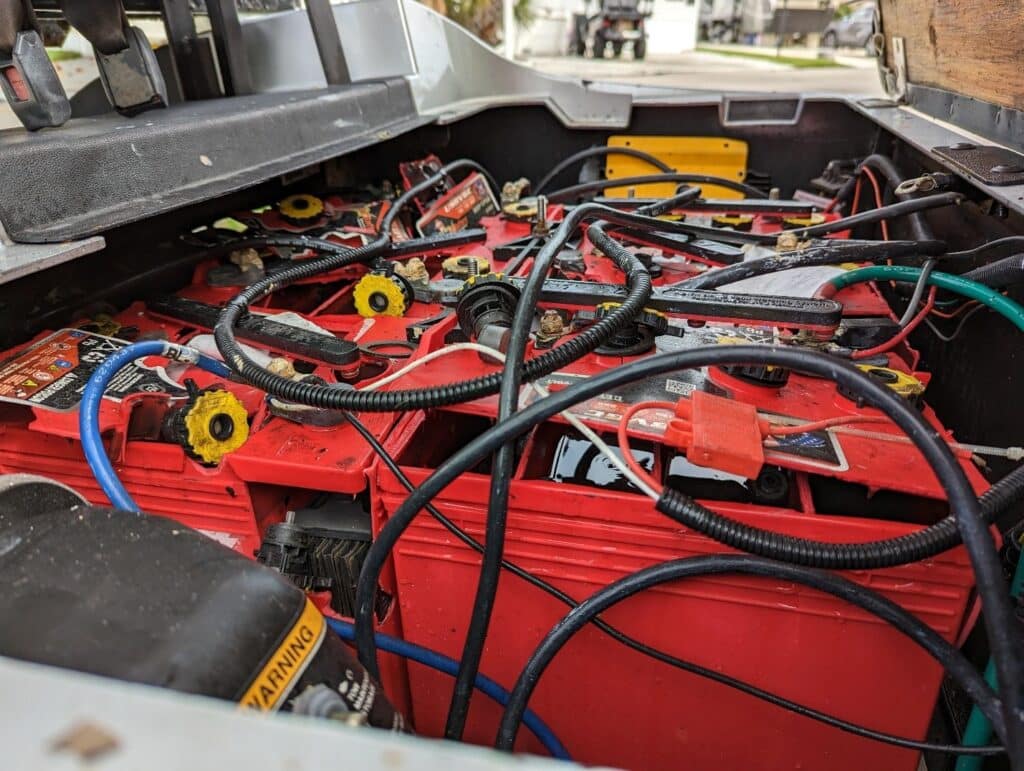
Lithium-ion batteries, on the other hand, are impacted much less by freezing weather. Since the electrolyte stays constant and doesn’t become diluted, it will not freeze in extremely cold temperatures. Although many types of lithium batteries can continue operating above subzero temperatures, it’s essential that they’re not charged when the weather dips below freezing. Charging a lithium-ion battery when its internal temperature is below 25° F can cause long-term and permanent damage to the battery.
If it is likely that your lithium batteries will be operating for extended periods of time in subfreezing temperatures, it is essential to heat the batteries to above 25°F before charging. Placing your batteries in an insulated, heated location, utilizing heating pads, or upgrading to internally heated batteries will allow you to safely use your lithium batteries in extremely cold temperatures.
Regardless of the chemistry of the batteries you use, cold weather will impact their ability to function. Since batteries run on chemical reactions, and as temperatures drop, these reactions are slowed down, limiting the battery’s operating capacity. Even though lithium-ion batteries perform the best in cold temperatures, they still have a safe operating temperature range that should be followed.
While this differs between manufacturers, Battle Born Batteries can discharge in temperatures anywhere from -4°F to 135°F. Additionally, they have a built-in BMS that prevents them from unsafe operating conditions and won’t allow the battery to operate outside the safe temperature range or accept or charge when the internal temperature of the battery drops below 25°F.
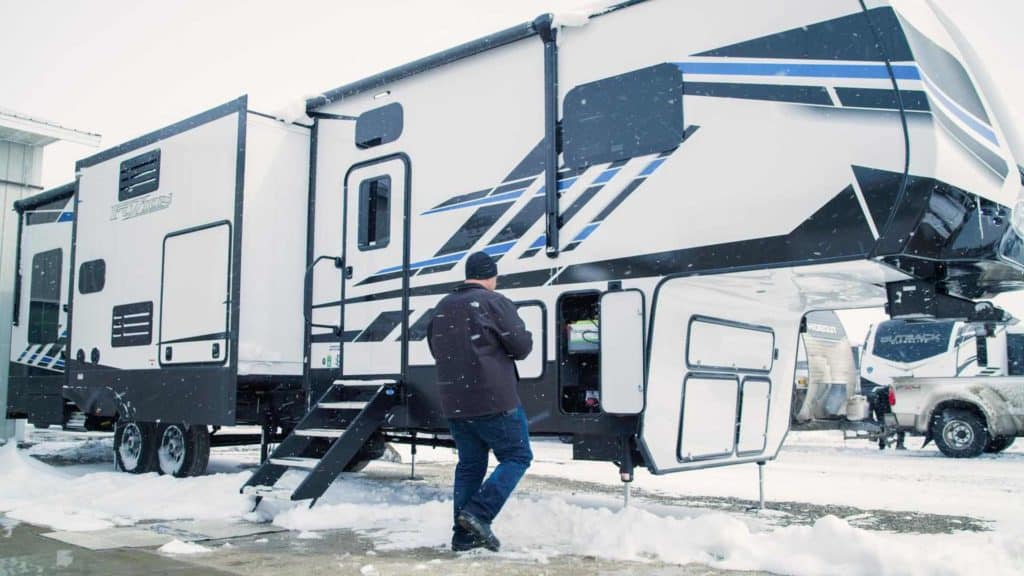
If your lithium batteries are likely to operate in subzero temperatures, we recommend taking the necessary precautions to stabilize their internal temperature to prevent extensive damage. Utilizing internally heated batteries and heating pads and storing your batteries in insulated, heated locations will allow your batteries to operate safely and efficiently, no matter how low temperatures get.
For those who will not be using their batteries when the temperatures drop below freezing, it’s generally best practice to disconnect them for storage. With Battle Born Batteries in particular, we recommend beginning by bringing them to a full state of charge. Then disconnect them completely and ensure they are stored somewhere temperatures will stay above -15°F. Storing your batteries in subzero weather (-15°F or lower) has the potential to crack the ABS plastic. Additionally, this could lead to a greater loss in charge than the expected 3% monthly charge.
You should never charge any battery when its internal temperature dips below freezing. This can cause severe and permanent damage to your battery. Always take the time to let the battery warm up to a safe temperature before you begin charging it. Using external heating pads and storing batteries in a heated compartment can help prevent cold weather from affecting your batteries.
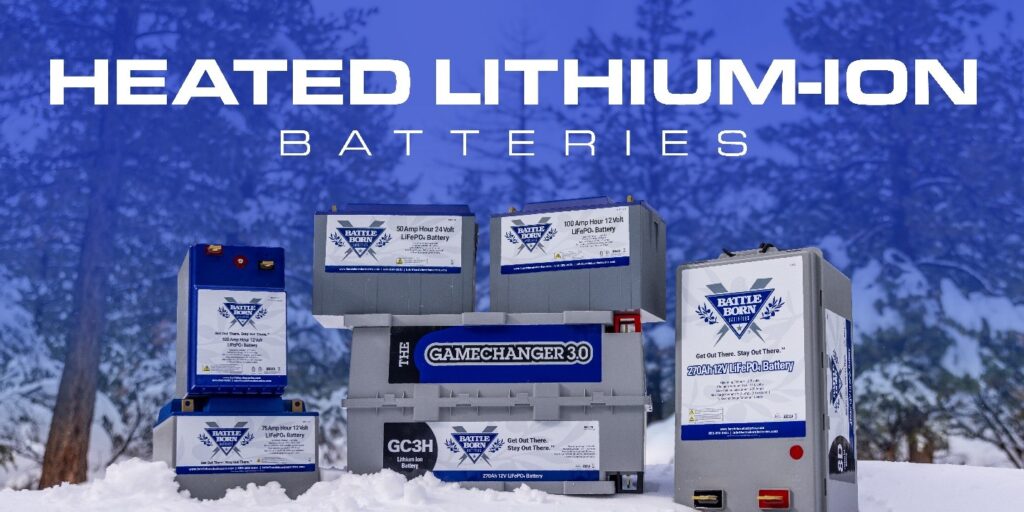
Internally heated lithium batteries are a great option for many applications. Especially if you plan to use your lithium batteries in freezing conditions for ice fishing, skiing, or other winter activities. Heated lithium batteries are the simplest way to ensure their internal temperature never gets below 25°F.
Battle Born heated LiFePO4 batteries use a proprietary, low-draw technology to maintain their internal temperature. Our heated battery kits come with an enable switch and necessary wires to enable and disable the heat function.
On the other hand, if you avoid subfreezing temperatures or store your batteries for the winter, a heated lithium battery may not be necessary. Deciding where and when you plan to use your batteries is essential. This will help ensure you get the right battery and system for your unique power needs.
Properly storing your lithium-ion batteries in winter helps extend their useable life. You should fully charge your batteries to 14.4 volts and disconnect all power draws. If your batteries are not completely disconnected during storage, parasitic loads can quickly drain your battery. When left for extended periods of time, your battery can enter low voltage disconnect. This means that it will be dead when you return to use it.
Once fully connected, your batteries can be stored with your rig or separately. You can safely store Battle Born Batteries in temperatures as low as -15°F and as high as 140°F. If your rig is stored somewhere that temperatures could be outside of this range, we recommend moving them. Battle Born Batteries require no ventilation and can be safely stored in enclosed spaces. Unlike lead acid batteries, it’s easy to ensure they remain in temperature-controlled areas.
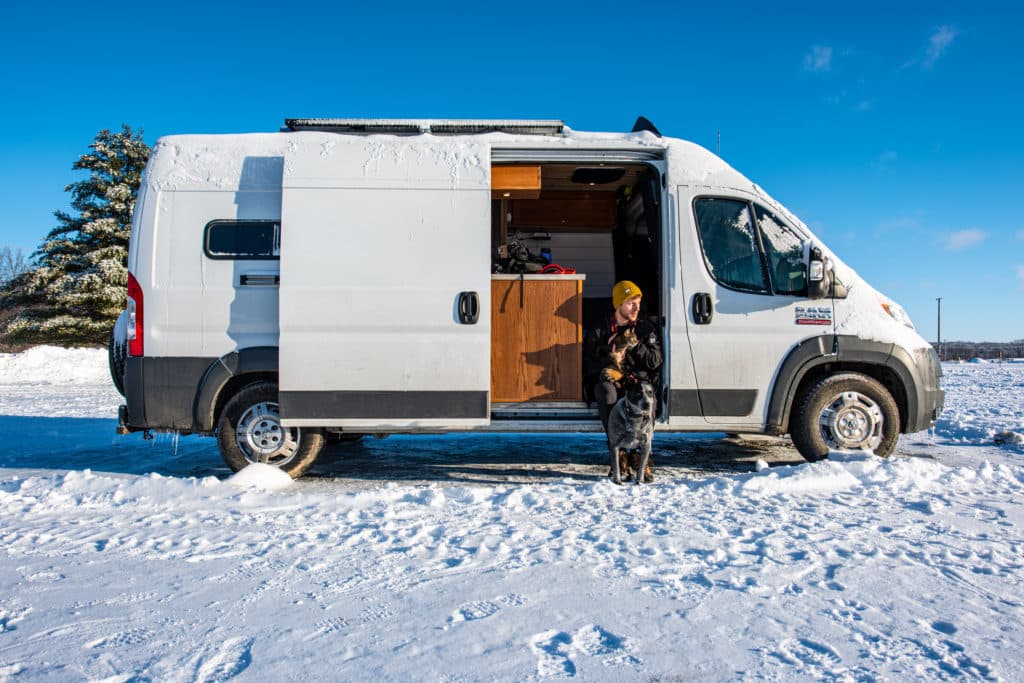
When it comes to using batteries in cold weather, lithium-ion chemistry outperforms other alternatives. Lithium batteries provide twice the power at half the weight of traditional lead-acid batteries. Additionally, lithium batteries are also more resilient in extreme temperatures. With the proper precautions and the right equipment, lithium batteries can power any cold-weather adventure. While lithium batteries may come with a premium price tag, the results they deliver make them worth every penny.
We know that building or upgrading an electrical system can be overwhelming, so we’re here to help. Our Reno, Nevada-based sales and customer service team is standing by at (855) 292-2831 to take your questions!
Also, join us on Facebook, Instagram, and YouTube to learn more about how lithium battery systems can power your lifestyle, see how others have built their systems, and gain the confidence to get out there and stay out there.
Shop Best Sellers








Ask a technical specialist now at 855.292.2831
Stay in the Know
6 thoughts on “Will Lithium Batteries Freeze?”
To the battlebornbatteries.com webmaster, Your posts are always well-received by the community.
Will your batteries be damaged if they are stored in -25F for a few days?
We do not recommend storing your batteries in subzero temperatures.
We bought a 4 battery system – Lithium 100 amp hour 12 volt LifePO4 system from you with a Victron 50 amp inverter and also a 12/12 charge system from the van engine and Solar controller. We have recently gotten off the road and moved to a sub-zero freezing area in Northern Iowa. We had a heater installed but the extra cold below zero temps lowered the reported interior temp to 14 degrees… and this afternoon we got a HIGH VOLTAGE WARNING. Unknown what caused it but we decided to remove all batteries and remove them to inside our house.
We could not figure out why the high voltage warning on the Victron system was lit up?
Hi Ed. Our batteries will no longer accept a charge when the internal temperature drops below 25°F. We also always recommend fully disconnecting your batteries when they are not in use and storing there somewhere they won’t encounter subzero temperatures. For more help troubleshooting, our technical sales team would be happy to help you! You can reach them at (855) 292-2831 (M-F 8:00am-4:30pm (PST)) or by emailing [email protected].
Hi battlebornbatteries.com admin, Thanks for the in-depth post!